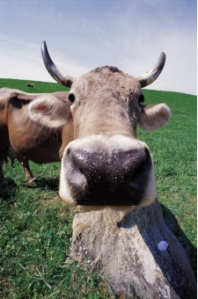Meat production in our environment is causing climate change.
Is Your Diet Destroying The Environment?
5 Reasons Why the Food on Your Plate is More Important Than the Car You Drive:
 Many people who “go green” consider buying something major like a hybrid car. A larger contribution to the environment is not in your driveway though, but in your fridge right now.
Many people who “go green” consider buying something major like a hybrid car. A larger contribution to the environment is not in your driveway though, but in your fridge right now.
The climate change cost of animal meat production is greater than the cost of cars, planes and all other forms of transport put together.
This is not just vegetarians or health advocates saying this either. The World Health Organization, Scientific American, New Scientist and Readers Digest have all come out with clear information on this fact.
Effects of Meat Production on the Planet
1. Cow Farts:
Cattle farting (and burping) methane – as has been joked about in the media – is a factor in global warming.
2. Plant Displacement:
The biggest impact of meat production is that it displaces useful plants. Trees, grasses and other year-round plants are what absorb CO2 and capture carbon on this planet but they are displaced for specific crops to house and feed cattle.
3. Water Pollution:
Rearing animals for meat contributes significantly to water pollution. Animal waste, antibiotics and hormones enter the water cycle alongside chemicals from tanneries, fertilizers and the pesticides used to spray feed crops.
4. Water Usage:
Raising cattle for food is incredibly inefficient in terms of water. Meat production is different in different parts of the world but even the more efficient systems use 1,500 gallons of water to produce a single pound of beef.
5. Overgrazing:
Overgrazing by cattle and other meat production of animals is so hard on the land that it can’t maintain any productive vegetation.
By the Numbers: Did You Know…?
One Fifth:
The amount of all pastures and ranges turned to a desert by overgrazing for meat.
One:
The number of meat-eating dogs it takes to match the carbon footprint of one gas-guzzling SUV.
Three:
The number of hours of driving it takes to match the greenhouse gas emissions and other pollution of one kilogram of beef.
Twenty:
The number of vegetarians who could live on the same amount of land as one meat-eater.
Twelve Thousand:
The number of gallons of water needed to raise a single pound of beef (in the inefficient production methods often used in North America).
220 Billion:
The number of gallons of hormone-, antibiotic- and bacteria-laden animal waste dumped onto farmland and into waterways from meat factory farms.
My Own Opinion
There are certainly many ways to save the environment and consuming less meat is a great part.
But…
People are slow to change their eating habits and the connection to the environment is not apparent to most.
I have found though, that when a person becomes interested in taking responsibility for their own health – they almost always become more environmentally conscious. They then start taking a number of “green” steps quite naturally.
That is what I try to help people with and one reason why we started RealFoodForLife.com.
Recipes and Ideas to Help You Go Meatless:
- Learn About Lentils – They are packed with protein and revitalize the ground they grow in.
- Better than meat, filled with vegan protein and yummy too: Adzuki Bean Stew & White Bean and Asparagus Stew
- Better than cows milk and yummy too: Almond Milk
- Read Eating Green, Clean and Lean: Principles and Recipes to Simplify and Energize Your Eating Habits.
Have YOU Helped Save the Environment In This Way or Others?



It’s good to be reminded how we take for granted that our arable land supports a meat eating industry and a wheat eating industry. There is very little left for vegetable and fruit crops continue to be developed into real estate. For years schools have taught the importance of meat and bread to the near exclusion of fruits and vegetables. When fruits and vegetables are continually presented as important snacks, it suggests that they aren’t as important as the main part of the meal. Thanks for this essay. Sue and Gord
The effects of Global Warming is getting much stronger these days. We should concentrate more on alternative energy to reduce carbon emissions.
I had the similar subject this past year. Around my experience, the very best solutions are patient and confident. Be realistic bravely, and you’ll be alright at last.
Hi Randy thank you for all your work. I watched a documentry a while ago about the shift from beef and how they are starting to raise chikens with such big breasts they cannot walk. Pretty sad and unhealthy. I buy local organic. I really like your news letters
Connie
Thanks Connie and Sheer for the comments. Yes the meet industry has some baaaad aberrations.
Hey there, I’m just into the net search few stuff and discovered your website. I am striked by the content that you have on this blog. It shows how good you know this topic. Bookmarked this website, will get back for more. You, buddie, ROll!!!
Everything About Fitness, Diet, and Health Related Issues.
waiting for more info about this topic
Thank you for that wonderful post. Waiting for much. ciao.
I’m wondering if I should use this write-up for our web site, Let me link it back to this web page though. However, if this is a difficulty please let me know and I most certainly take it down promptly. I actually enjoy the valuable advice you offer inside your articles. My partner and i will bookmark your website and get our colleagues visit here routinely. I am reasonably convinced they will come across lots of new details here in comparison with any one else .Thanks a lot with regards to sharing this content.
That’s pretty helpful thing! But i ‘ve got few things to ask. How shall i contact u?
Thank you for sharing superb informations. Your website is so cool. I am impressed by the details that you have on this blog. It reveals how nicely you understand this subject. Bookmarked this web page, will come back for more articles. You, my friend, ROCK! I found just the information I already searched everywhere and simply could not come across. What a great site. www.gianluigic2233.net
An fascinating dialogue is worth a observe. I ponder that it’s paramount to enter more on this subject, it may not ensue a forbid issue however generally folks are not ample to talk resting on such topics. Headed for the subsequently. Cheers
Nice post thanks
Although the story is interesting, but come on… cow farts are real, but it’s been there since how many years? Global warming has more to do with things that we can’t control.
It’s undeniable that our dietary choices have a significant impact on the environment. The environmental cost of meat production, from methane emissions to land use, is indeed substantial. Opting for more sustainable food choices can make a meaningful difference in reducing our carbon footprint. It’s a reminder that what we put on our plates matters just as much as the decisions we make about transportation and other environmental factors.
Yes, Strona, I agree. It is im[important for our body’s health and the earth’s health is the way forward.